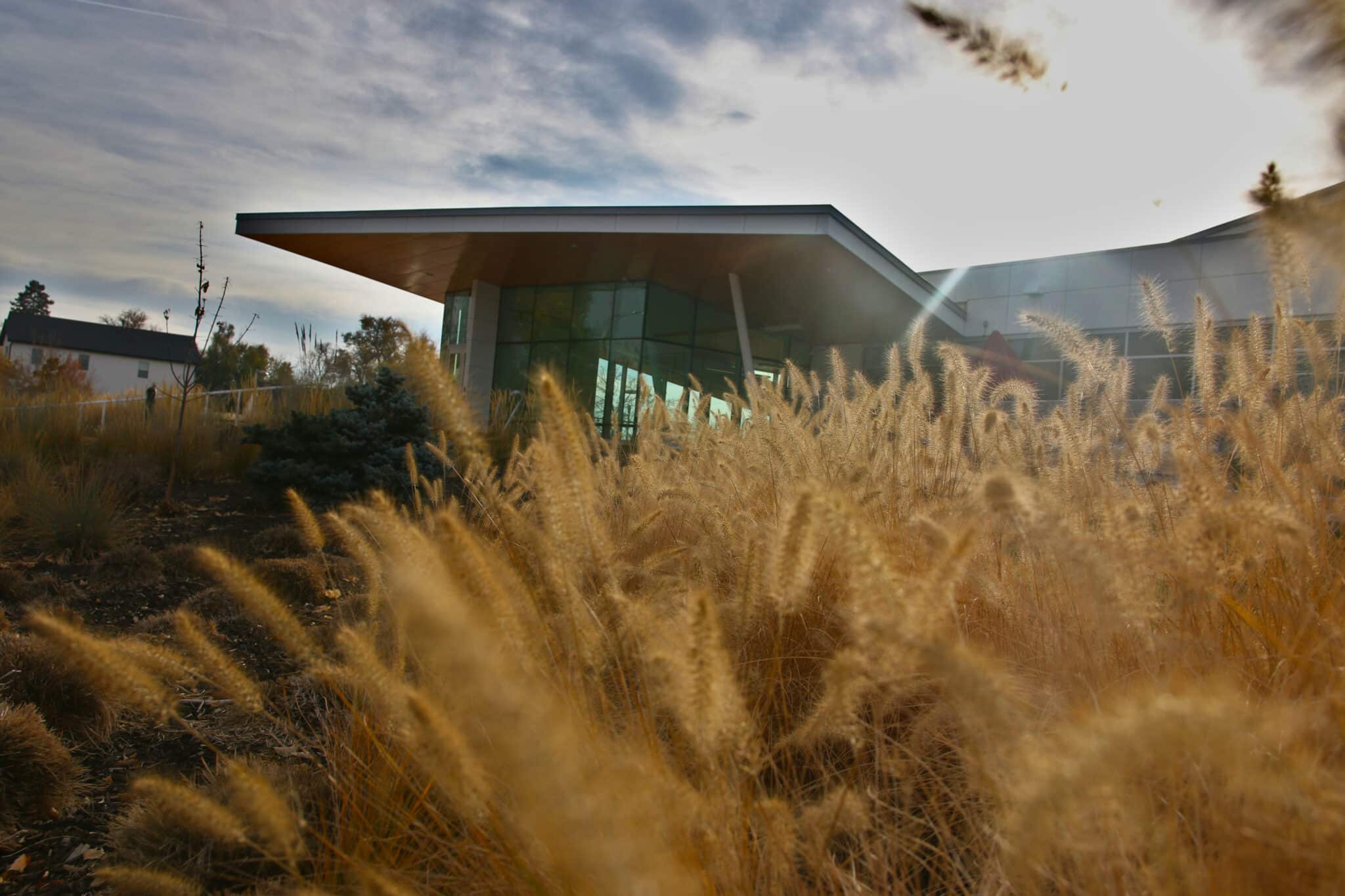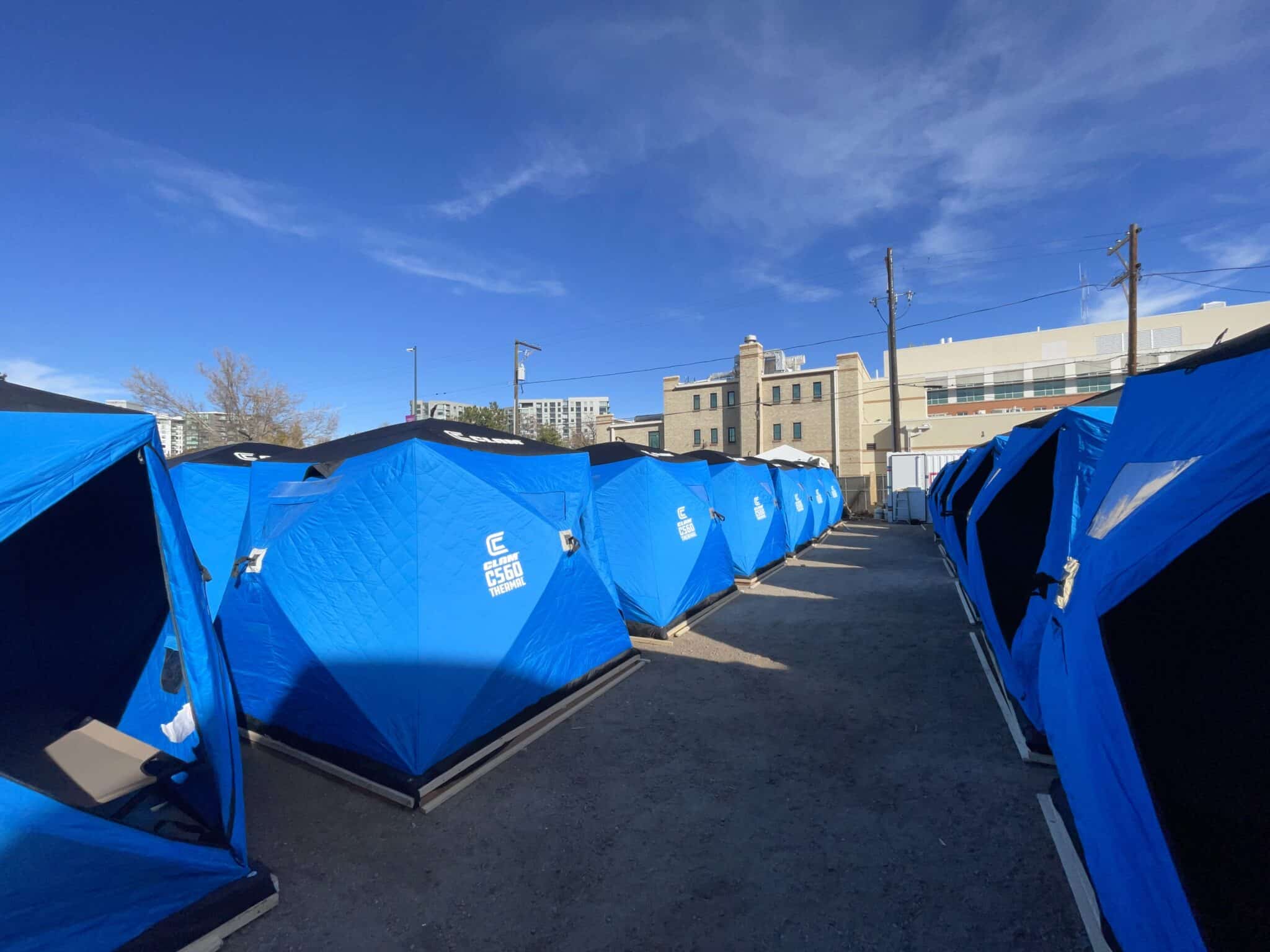
A homeless camp opened at the city-owned property at 3815 N. Steele St., adjacent to the Denver Human Services east branch, which can shelter up to 60 people. (BusinessDen file photos)
Colorado Village Collaborative has moved out of the Park Hill neighborhood and into Clayton.
The nonprofit, which operates Denver’s sanctioned homeless camps, closed its campsite next to Park Hill United Methodist Church on Tuesday and opened one next to the Denver Human Services east branch.
The latter is the first sanctioned campsite to open on public property in Denver, after being approved by the Denver City Council late last month in a 10-1 vote. Councilwoman Amanda Sawyer voted no.
“We’ve received a warm welcome at the Denver Human Services location and we’re looking forward to operating our first Safe Outdoor Space on city-owned property,” CVC spokeswoman Jennifer Forke told BusinessDen Monday, using the nonprofit’s term for the camps.
The Clayton site will shelter homeless people until at least November 2022. The lease could be extended through the end of 2023.
Forker said the site was originally planned for up to 40 tents for 50 people, but that was later expanded by eight tents and 10 people. Those staying at the Park Hill campsite were given space in the new one in Clayton.
The Park Hill campsite, which was established in June and had always been slated to close by the end of this year, had been contentious. Nearby residents unsuccessfully appealed its establishment to a city zoning board, and then in August filed a lawsuit challenging the city’s authority to allow the campsites in general — regardless of location. That case is ongoing.

Ice fishing tents, similar to the ones shown here at the 780 Elati St. homeless campsite, will be used to temporarily shelter people at the Clayton neighborhood campsite.
Another campsite, which opened last month in Lincoln Park, has also encountered opposition. The neighborhood association there and CVC were unable to come to terms on a “good neighbor” agreement. And 46 nearby residents have appealed the establishment of the campsite to the same city board that rejected the Park Hill appeal.
In Clayton, however — where the campsite is generally further from homes than in Lincoln Park and Park Hill — CVC was able to reach a good neighbor agreement with the Clayton United neighborhood organization.
Fred Glick, a board member of the neighborhood group, lives about a half mile from the camp and said it gives homeless people a place to go instead of sleeping on street medians and in parks.
“I think it’s the right thing to do,” Glick said. “There are unhoused people staying in neighborhoods in Denver and doing their best to not be visible.”
Glick said he attended the volunteer day Dec. 7 where people helped build the platforms for the camp’s ice fishing tents and met a couple who plan to offer haircuts to residents.
“I just think it kind of speaks to the neighborhood ethos here, and there’s been I think very little real pushback,” Glick said.
The sanctioned campsites were allowed to operate starting in late 2020 to protect homeless people from COVID-19, giving them a place to adequately socially distance.
But in recent months, they’ve emerged as a way for the city to temporarily shelter some of the hundreds of people living on Denver’s streets. Mayor Michael Hancock in his 2022 budget earmarked $4.3 million to support sanctioned campsites as well as safe outdoor parking and tiny home villages.

A homeless camp opened at the city-owned property at 3815 N. Steele St., adjacent to the Denver Human Services east branch, which can shelter up to 60 people. (BusinessDen file photos)
Colorado Village Collaborative has moved out of the Park Hill neighborhood and into Clayton.
The nonprofit, which operates Denver’s sanctioned homeless camps, closed its campsite next to Park Hill United Methodist Church on Tuesday and opened one next to the Denver Human Services east branch.
The latter is the first sanctioned campsite to open on public property in Denver, after being approved by the Denver City Council late last month in a 10-1 vote. Councilwoman Amanda Sawyer voted no.
“We’ve received a warm welcome at the Denver Human Services location and we’re looking forward to operating our first Safe Outdoor Space on city-owned property,” CVC spokeswoman Jennifer Forke told BusinessDen Monday, using the nonprofit’s term for the camps.
The Clayton site will shelter homeless people until at least November 2022. The lease could be extended through the end of 2023.
Forker said the site was originally planned for up to 40 tents for 50 people, but that was later expanded by eight tents and 10 people. Those staying at the Park Hill campsite were given space in the new one in Clayton.
The Park Hill campsite, which was established in June and had always been slated to close by the end of this year, had been contentious. Nearby residents unsuccessfully appealed its establishment to a city zoning board, and then in August filed a lawsuit challenging the city’s authority to allow the campsites in general — regardless of location. That case is ongoing.

Ice fishing tents, similar to the ones shown here at the 780 Elati St. homeless campsite, will be used to temporarily shelter people at the Clayton neighborhood campsite.
Another campsite, which opened last month in Lincoln Park, has also encountered opposition. The neighborhood association there and CVC were unable to come to terms on a “good neighbor” agreement. And 46 nearby residents have appealed the establishment of the campsite to the same city board that rejected the Park Hill appeal.
In Clayton, however — where the campsite is generally further from homes than in Lincoln Park and Park Hill — CVC was able to reach a good neighbor agreement with the Clayton United neighborhood organization.
Fred Glick, a board member of the neighborhood group, lives about a half mile from the camp and said it gives homeless people a place to go instead of sleeping on street medians and in parks.
“I think it’s the right thing to do,” Glick said. “There are unhoused people staying in neighborhoods in Denver and doing their best to not be visible.”
Glick said he attended the volunteer day Dec. 7 where people helped build the platforms for the camp’s ice fishing tents and met a couple who plan to offer haircuts to residents.
“I just think it kind of speaks to the neighborhood ethos here, and there’s been I think very little real pushback,” Glick said.
The sanctioned campsites were allowed to operate starting in late 2020 to protect homeless people from COVID-19, giving them a place to adequately socially distance.
But in recent months, they’ve emerged as a way for the city to temporarily shelter some of the hundreds of people living on Denver’s streets. Mayor Michael Hancock in his 2022 budget earmarked $4.3 million to support sanctioned campsites as well as safe outdoor parking and tiny home villages.
